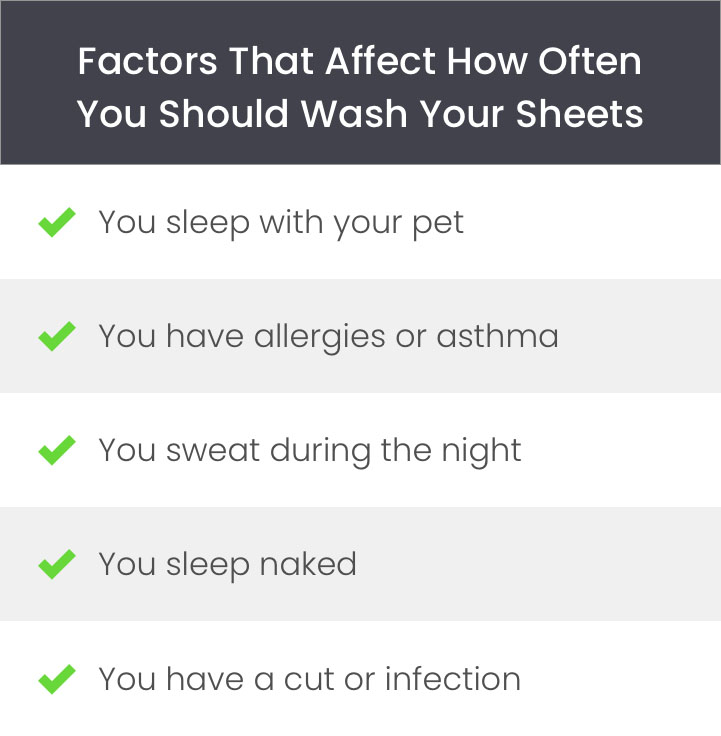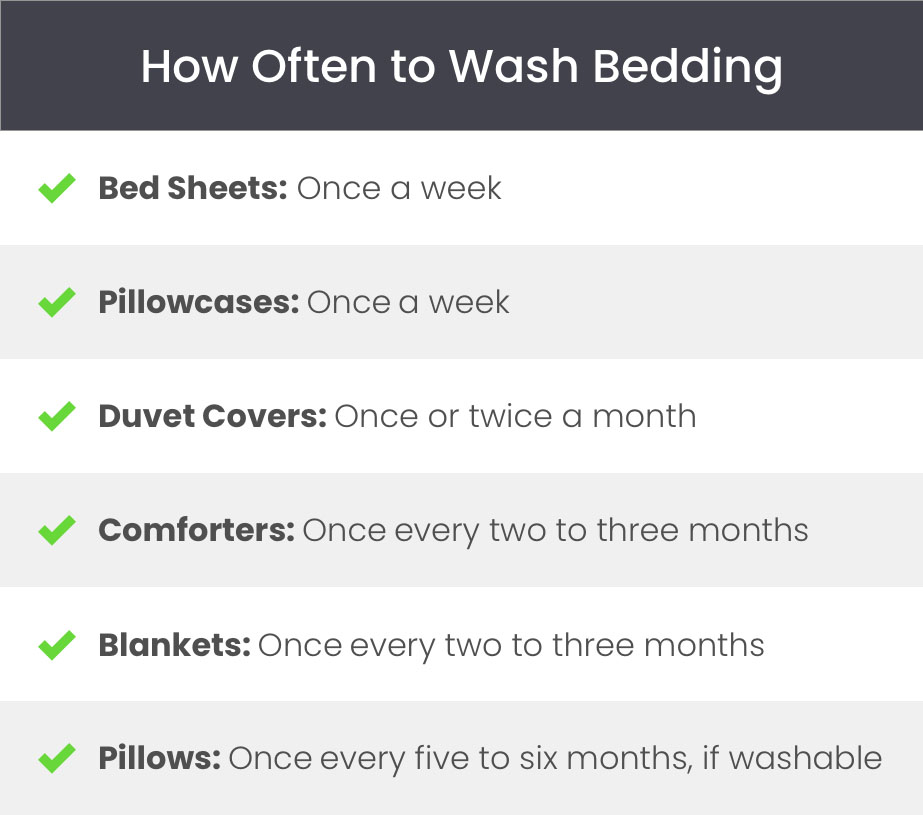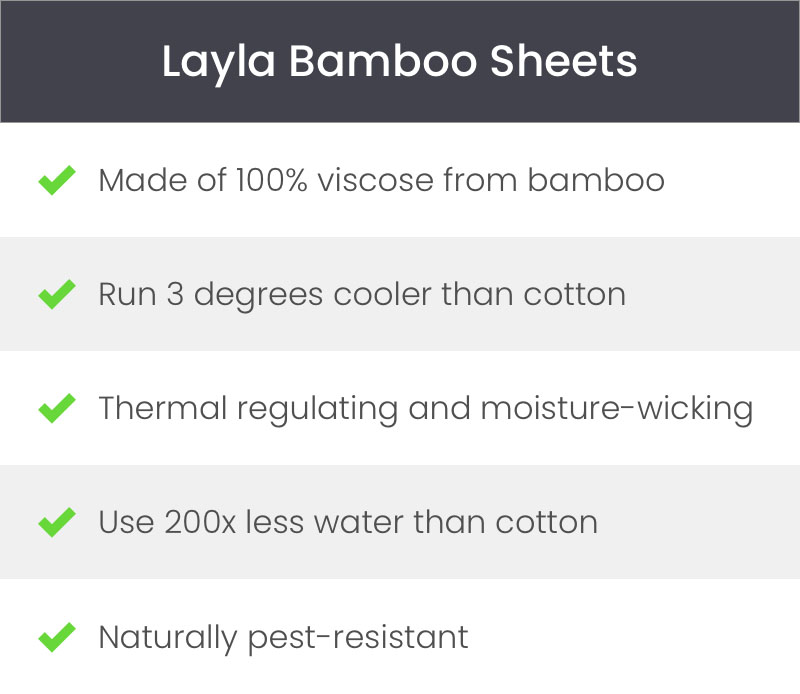How Often Should You Wash Your Sheets?

This article will discuss how often to wash sheets to ensure your bed is safe, healthy, and comfortable.
- How Often Should You Wash Your Bed Sheets?
- Reasons Why You Should Wash Your Sheets
- How to Wash Bed Sheets
- How Often to Wash Other Bedding
- Key Takeaways: Washing Sheets
How Often Should You Wash Your Bed Sheets?
You should wash your bed sheets a minimum of once a week, no matter what. Throughout the day, your body builds up dirt, sweat, and oil that can follow you into your bed. Since many people don’t bathe before hitting the sheets, they’re bringing an entire day’s worth of dirt and grime into bed with them. Proper sleep hygiene is important, including how well you take care of your sheets. Without regularly cleaning them, your sheets can cause allergies, skin conditions, and even asthma.

Factors That Affect How Often to Wash Sheets
How often you should wash your sheets depends on a number of factors. Of course, some people may have to wash their sheets more than once a week. To know how often to wash your sheets, you’ll need to consider your lifestyle, sleep hygiene, and habits. These are other factors that affect how frequently your sheets need to be washed:

- You sleep with your pet: Sleeping with your pet can help you fall asleep faster and stay asleep throughout the entire night, but it can also have the opposite effect. Not only do some pets like to take up a ton of space, but they also bring more dirt into your bed, especially if they spend a portion of the day outside. Consider all of the dirt and mud Fido gets into on his walks. Remember, your pet likely doesn’t bathe every day, which means they might have weeks worth of dirt and grime stuck in their paw pads, nails, and fur. Not only that, but pets with fleas or ticks can bring them into your bed. If you’re going to sleep with your pet, consider washing your sheets at least twice a week, depending on how dirty you believe your pet is.
- You have allergies or asthma: If you experience allergies or asthma, you’re likely allergic to dust no matter what season it is. If your sheets aren’t washed regularly, you might realize that you have worsening allergy symptoms before bed or during sleep, which can keep you awake at night. If you want to ensure your bed is truly free of allergens, consider washing your sheets, including your pillowcases, more often, and consider investing in hypoallergenic bedding.
- You sweat during the night: Many people are hot sleepers who sweat during sleep no matter how comfortable the air temperature is. If you sweat a lot at night, consider how much sweat is getting stuck in your sheets. When deciding which sheets are right for you, consider bamboo or cotton sheets for night sweats, as they are breathable and moisture-wicking.
- You sleep naked: If you like to sleep naked, you should provide yourself with a clean place to do so. Because you don’t have clothes to stop skin cells, dirt, and natural oil from your body from getting onto your bed, you should clean your sheets more often to prevent skin irritation and give your body the clean space it deserves to sleep in.
- You have a cut or infection: If you have a cut or an infection, consider washing your sheets at least twice a week to ensure no dirt can enter your wound. Washing your sheets can also prevent blood stains in your bed if your cut opens up in the middle of the night.
Should You Wash New Bed Sheets?
Most people believe that because they purchased new sheets, they don’t have to wash them. However, new sheets have chemicals and dyes that can cause skin irritation. You should also wash new sheets to be safe because you don’t know who has possibly touched them during the packaging and transporting process. Additionally, washing new sheets allows you to make them smell like your bed by using your favorite detergent.
Reasons Why You Should Wash Your Sheets
Now that you understand how often to wash bed sheets, it’s important to understand why you should wash them weekly. Even though you might not be able to see the dirt accumulate on your sheets, it’s there. Dead skin cells attract dust mites that like to eat those dead skin cells. There’s no reason to invite more critters into your bed by avoiding this single household chore. Without washing your sheets, you could be negatively impacting your sleep quality and health. Here are the reasons why you should wash your sheets:
- Prevent acne and eczema: Sleeping in dirty sheets can clog your pores, while dirt and grime can irritate skin conditions, such as eczema. Keeping your sheets clean prevents skin problems from worsening and can even improve current skin conditions if the problem is related to dirty sheets.
- Avoid skin irritations: Dust is an allergen that can irritate your skin. Additional, dead skin cells can rub up against your skin at night and clog your pores, further irritating your skin. By washing your sheets, you eliminate all potential skin irritants from your bed.
- Prevent allergies: Again, dust is an allergen that affects people differently. If you get allergies in bed, you might find washing your sheets helps you avoid the sniffles so you can get better sleep.
- Get rid of dust mites: Dust mites are small bugs that can inhabit your bed. Some people are allergic to dust mites, which can cause worsening allergy symptoms. Plus, no one wants bugs in their beds!
- Remove pet dander and fur: You may love your pet, but you don’t want their fur and slobber rubbing up against you while you sleep. If you sleep in bed with your pet, consider washing your sheets more often to ensure their fur doesn’t build up.
- Improve sleep quality: The main goal of washing your sheets is to ensure your sleep quality. Not washing your sheets comes with a host of problems that can prevent you from getting the sleep you truly deserve. Not only can you prevent skin problems, allergies, and bugs, but washing your sheets with your favorite detergent can act as a sort of aromatherapy that helps you relax as you fall asleep.
Your sheets are part of your sleeping environment, which can impact your quality of sleep. Learn how sheets affect sleep.
How to Wash Bed Sheets
No one enjoys doing household chores, but having clean sheets will keep you motivated to wash them every week. Washing your sheets is easy; just follow these simple instructions:
- Check the care instructions on the label
- Pretreat stains with baking soda or stain removal products
- When adding water to a washing machine, use warm or hot water, unless stated otherwise on the care instructions
- Add detergent to the washing machine
- Insert sheets into the washing machine
- When the wash cycle is complete, put your sheets in the dryer using the permanent press setting. If you don’t have a permanent press setting, use the warm setting. Never dry your sheets on high heat.
- Remove your sheets from the dryer and place them on the bed.
How Often to Wash Other Bedding
Your sheets are just one part of your entire bed. Of course, you should clean your bed beyond just the sheets alone. You might also be wondering how often to wash a comforter. Remember, you have pillowcases, comforters, blankets, pillows, and even memory foam mattress covers that can all attract dirt, sweat, and dead skin cells. Here’s how often to wash other types of bedding:

- Bed Sheets: Once a week
- Pillowcases: Once a week
- Duvet Covers: Once or twice a month
- Comforters: Once every two to three months
- Blankets: Once every two to three months
- Pillows: Once every five to six months, if washable
Key Takeaways: Washing Sheets
Washing your bedsheets is a necessity, and it should become part of your weekly household chores. By cleaning your sheets, you’ll prevent allergies, asthma, and skin problems while ensuring your bed is comfortable for a quality night’s rest.

Looking for comfortable sheets? Check out the Layla Bamboo Sheets, made of viscose from bamboo. But, what are bamboo sheets? They’re soft, lush, yet affordable sheets that feel more comfortable and breezy than cotton. In fact, bamboo sheets run three degrees cooler than cotton, ensuring you won’t get too hot or too sweaty while you slumber. These hypoallergenic sheets can help keep allergies at bay, but don’t forget to wash them weekly!






